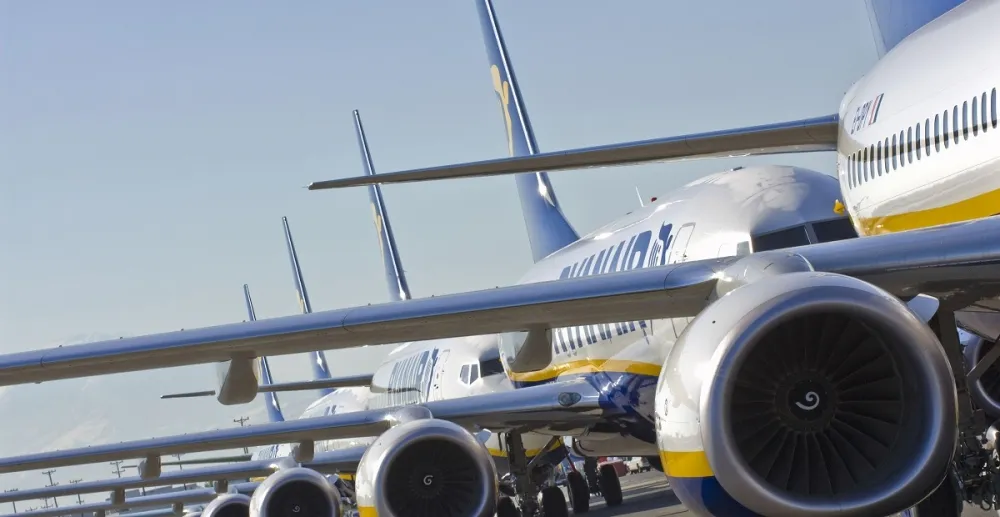
Ryanair cancels up to 30 flights due to strike threat.
Jul 11, 2018

Ryanair has announced the cancellation of up to 30 flights amid a looming strike threat from its pilots and cabin crew. The airline is grappling with staff unrest as employees demand better pay and working conditions. The cancellations primarily affect routes across Europe, causing significant disruption for travelers during a busy travel period. Passengers have been urged to check their flight status and explore alternative travel arrangements. Ryanair's management is in discussions with unions to resolve the ongoing disputes, but the uncertainty surrounding the strike continues to impact operations, leaving many travelers frustrated and anxious about their plans.
In recent developments, "Ryanair", the low-cost airline, has announced the cancellation of up to "30 flights" due to a looming strike threat. This decision has raised concerns among travelers, particularly those who planned their trips during this busy travel season. With a significant number of passengers affected, it is essential to understand the implications of this situation and explore potential alternatives for affected travelers.
The Impact of Flight Cancellations
The cancellations have caused a ripple effect throughout the travel industry, impacting not only passengers but also airport operations and related businesses. When airlines like Ryanair cancel flights, it can lead to increased congestion at airports, as travelers scramble to find alternative routes. Below is a table that outlines the potential impact of these cancellations:
| Impact | Details |
|---|---|
| Passenger Disruption | Thousands of passengers may be left stranded or forced to find last-minute accommodations. |
| Increased Airport Congestion | With canceled flights, airports can become overcrowded as passengers seek alternatives. |
| Economic Loss | Local businesses around airports may face reduced foot traffic, affecting their revenue. |
| Emotional Stress | Travelers may experience anxiety and frustration due to unexpected changes in their travel plans. |
Reasons Behind the Strike Threat
The strike threat has been attributed to various factors, including wage disputes and working conditions for airline staff. Unions representing flight crews and other personnel have voiced their concerns over insufficient pay and increased workloads, especially during peak travel times. The possibility of a strike underscores the ongoing tension between airline management and employees, an issue that has been prevalent in the aviation industry for years. Here are some key reasons contributing to the strike threat:
- Wage Disputes: Employees are demanding fair compensation that reflects their workload and the rising cost of living.
- Working Conditions: Concerns over long hours and insufficient rest periods have led to calls for better working conditions.
- Job Security: The uncertainty around job stability in the post-COVID-19 environment is fueling employee anxiety.
What Affected Passengers Should Do
For passengers whose flights have been canceled by Ryanair, it is crucial to remain informed and proactive. Here are some steps to take:
- Check for Notifications: Always keep an eye on your email and Ryanair’s official website for updates regarding your flight status.
- Explore Alternative Flights: Look for other airlines offering similar routes, and consider booking with them if necessary.
- Contact Customer Service: Reach out to Ryanair’s customer service for assistance with rebooking options and potential refunds.
- Plan for Accommodation: If your travel plans are significantly disrupted, be prepared to find nearby accommodations.
Travel Alternatives and Solutions
While the cancellation of flights can be extremely inconvenient, there are several alternatives and solutions available for travelers:
1. "Alternative Airlines": Consider booking flights with other low-cost carriers or major airlines that may offer comparable routes at competitive prices.
2. "Train or Bus Services": In some regions, ground transportation such as trains or buses can serve as effective alternatives to air travel.
3. "Flexible Travel Dates": If possible, adjust your travel dates to avoid peak times when cancellations are more likely to occur.
Conclusion
The recent announcement by Ryanair to cancel up to "30 flights" due to a strike threat highlights the ongoing challenges faced by airlines and their employees. As passengers navigate these disruptions, staying informed and exploring alternative travel options will be essential. By understanding the situation and taking proactive steps, travelers can mitigate the impact of such cancellations on their plans.
In summary, whether you are a frequent flyer or planning a one-time trip, being prepared and adaptable is key in today’s rapidly changing travel landscape.
Related Articles

Explore Thailand: The Best Islands to Visit for Paradise, Adventure, and Relaxation

The Ultimate Guide to the Best Islands in Thailand for Your Next Getaway

Do babies need passports? How to get a passport for a newborn

How to get a U.S. passport fast: here’s how to expedite the process

What is Mobile Passport Control: 5 reasons why you should use it

SENTRI vs. Global Entry: A detailed guide

Do you need a passport to go to the Bahamas? Let’s find out

Do you need a passport to go to Mexico? A detailed guide

Do you need a passport to go to Canada? We got the answer

Do You Need a Passport for a Cruise: An Essential Travel Guide

Booster Seat Requirements: All the Rules to Follow in Your Rental Car

What Are the World’s Most Powerful Passports, and How Does Yours Rank?

How to Take a Passport Photo at Home: A Helpful Guide

You've got to have heart! Southwest's new livery

Your opinion: Should water be free on low cost carriers?

Young women bolder than guys as solo travellers
